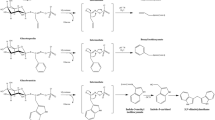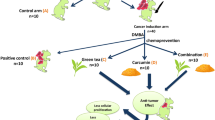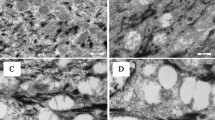Abstract
LARGE intravenous doses of griseofulvin in rats have been found to arrest mitosis in metaphase in certain organs, for example, bone marrow, seminal epithelium and intestinal epithelium. We postulated that since griseofulvin taken orally is soon found in the keratin layer of the skin, there might be an antimitotic effect with a delay in the production, and a reduction in the number, of tumours that would be produced by applications of methylcholanthrene to the epidermis of mice. A pilot experiment was performed which gave quite unexpected results.
This is a preview of subscription content, access via your institution
Access options
Subscribe to this journal
Receive 51 print issues and online access
$199.00 per year
only $3.90 per issue
Buy this article
- Purchase on Springer Link
- Instant access to full article PDF
Prices may be subject to local taxes which are calculated during checkout
Similar content being viewed by others
Author information
Authors and Affiliations
Rights and permissions
About this article
Cite this article
BARICH, L., NAKAI, T., SCHWARZ, J. et al. Tumour-promoting Effect of Excessively Large Doses of Oral Griseofulvin on Tumours induced in Mice by Methylcholanthrene. Nature 187, 335–336 (1960). https://doi.org/10.1038/187335b0
Issue Date:
DOI: https://doi.org/10.1038/187335b0
Comments
By submitting a comment you agree to abide by our Terms and Community Guidelines. If you find something abusive or that does not comply with our terms or guidelines please flag it as inappropriate.



